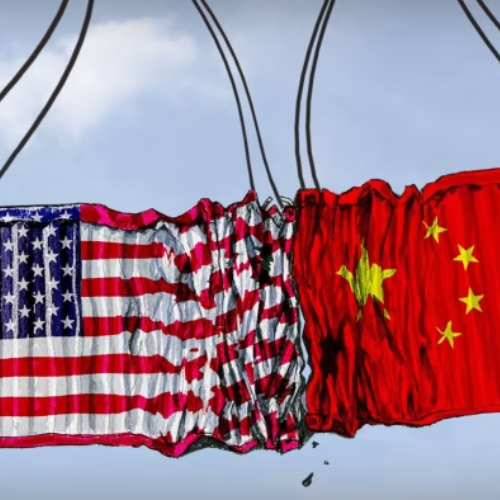China has announced a new wave of trade restrictions targeting dozens of U.S. companies in what is being seen as an intensification of economic tensions with Washington. On Thursday, Beijing revealed punitive measures against 28 American firms, including major defense contractors like Raytheon, Boeing, and Lockheed Martin. These actions are part of a broader effort by China to respond to U.S. policies it considers a threat to its national security.
China’s Ministry of Commerce stated that these measures aim to “safeguard national security and interests.” They include adding these companies to an export control list, banning the sale of items with both civilian and military uses, and placing some firms on what is called an “unreliable entities list.” Companies on this list are prohibited from conducting business in China, while their executives are banned from entering or living in the country.
The move highlights the growing hostility between the two global powers as they clash over trade, technology, and security issues. Although many of the targeted U.S. companies already faced restrictions, the breadth and scale of this announcement signal a more aggressive stance from Beijing.
American Defense Firms in the Crosshairs
Among the U.S. companies hit by these restrictions are prominent defense contractors that play a significant role in the American military-industrial complex. Firms such as Raytheon Missile Systems, Boeing Defense, and Lockheed Martin have been singled out by Chinese authorities. These companies produce advanced weapons, defense systems, and aerospace technologies—fields that are critical to both countries’ security and economic interests.
China Slams 7 US Military Companies with Sanctions Over Taiwan Support
The measures include banning exports of “dual-use items” to these companies. Dual-use items are technologies or materials that can be used for both civilian and military purposes. By cutting off access to such items, China is attempting to disrupt the supply chains of these firms.
China’s targeting of these companies is partly tied to their involvement in arms sales to Taiwan, an issue Beijing considers a major violation of its sovereignty. The “unreliable entities list” effectively shuts these companies out of China’s massive market, though analysts say the practical impact might be limited since these firms already have a minimal business presence in China.
A Pattern of Tit-for-Tat Measures
This latest move is part of a larger pattern of economic retaliation between China and the United States. Over the past few years, both nations have imposed escalating restrictions on each other’s companies, signaling a broader trade and technology conflict.
The conflict began during the administration of Donald Trump, who introduced tariffs and trade restrictions aimed at curbing China’s economic influence. Initially, Beijing’s responses were symbolic and cautious, but the dynamics have shifted over time. Under President Joe Biden, the U.S. has expanded its sanctions against Chinese firms, recently adding 140 companies to its own blacklist for reasons similar to those cited by Beijing.
China Warns US Over Treasury Hacking Accusation; Slams it as Disinformation
In addition to targeting American firms, China has also announced bans on the export of rare minerals critical for high-tech industries in the U.S. It has launched investigations into American companies like Nvidia and taken other steps to expose vulnerabilities in U.S. supply chains.
Experts note that while China’s retaliatory measures often appear symbolic, their frequency and scope have increased significantly. This shows a growing willingness by Beijing to mirror Washington’s tactics and respond more aggressively to U.S. policies.
Broader Implications of the Trade Battle
This escalation highlights the deepening divide between the world’s two largest economies. The U.S. and China are increasingly using trade restrictions and sanctions as tools in their broader competition over economic and military dominance.
While some industry observers argue that the direct impact of China’s measures may be limited—given that many of the targeted firms do not rely heavily on Chinese markets—the broader implications are significant. These actions contribute to an atmosphere of uncertainty and tension, affecting global trade and international relations.
For now, the battle continues, with both sides ramping up measures to assert their interests. The implications of this ongoing economic conflict will be felt not just by the companies involved but also by industries and consumers around the world.


